November 4, 2025
Managing a pest control business is a challenging and unpredictable endeavor. One moment, everything is running smoothly, and the next, a client calls in a panic over a sudden rodent infestation or termite outbreak.
These urgent situations can disrupt schedules, frustrate customers, and put pressure on your team. Effective scheduling for emergency pest calls is essential to maintain service quality and keep operations running smoothly.
By using pest emergency software, companies can quickly assign technicians, optimize routes, and respond more efficiently, transforming reactive chaos into controlled, streamlined operations.
Managing Urgent Pest Calls Made Easy: How Pest Emergency Software Saves the Day
Managing a pest control business can be chaotic. One moment, technicians finish routine jobs; the following, urgent calls for rodent or termite infestations disrupt everything.
Reactive approaches often fail when multiple emergencies occur, causing congestion and frustrating clients. Pest emergency softwares like PestBase changes this.
With real-time scheduling, GPS tracking, automated dispatch, and CRM integration, urgent calls are handled efficiently and effectively.
With these software solutions, you can experience calendars being reprioritized automatically, the nearest technicians being notified instantly, and spare trucks being ready for deployment, turning chaos into smooth, controlled operations.
Key Takeaways
- Faster response times: Address urgent pest issues promptly, improving customer satisfaction.
- Automation is the backbone of modern pest control operations: Real-time scheduling, instant technician alerts, and route optimization eliminate delays and manual chaos.
- Resource management determines profitability: Having spare trucks, on-call technicians, and GPS tracking ensures faster responses without compromising ongoing jobs.
- CRM integration drives smarter decisions: Centralized data on customer history, past infestations, and treatments helps teams provide personalized, efficient service.
- AI and predictive scheduling are the future: From anticipating seasonal call surges to auto-deploying nearby technicians, intelligent software like PestBase keeps businesses proactive, not reactive.
The Challenge of Emergency Pest Control Scheduling
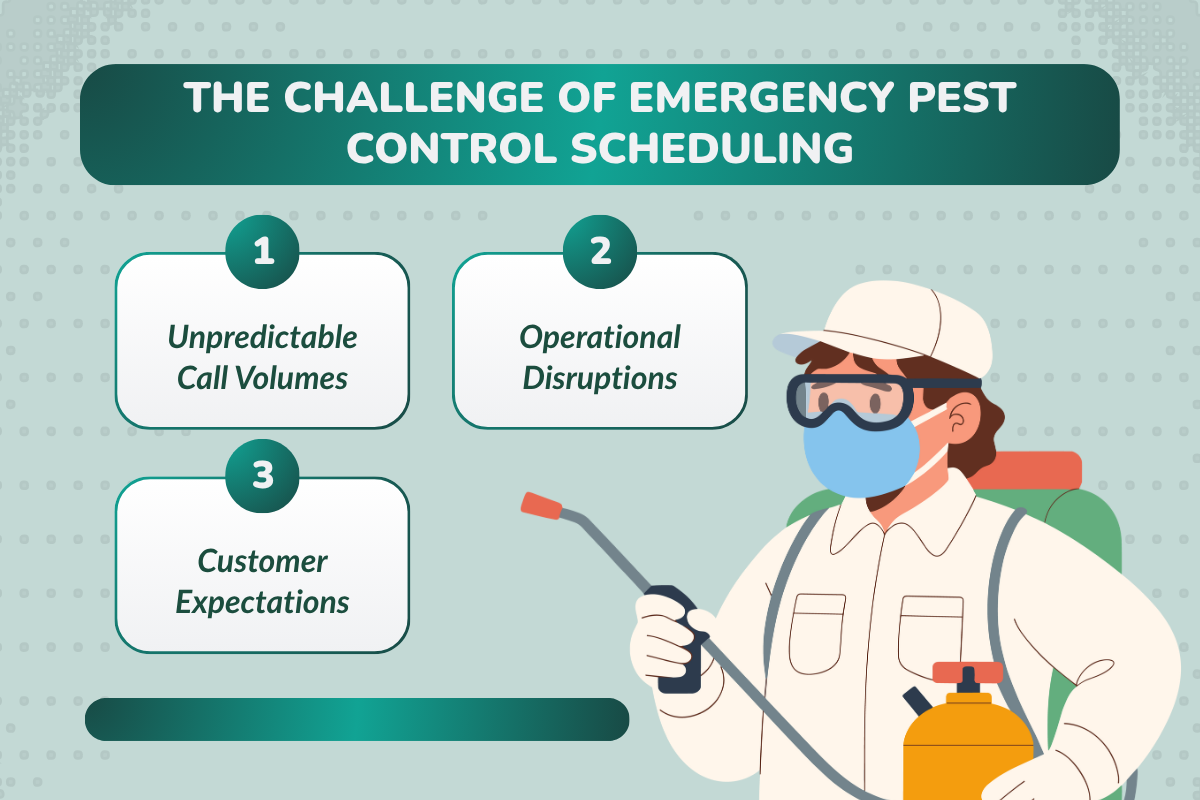
Emergency pest calls are unpredictable, often disrupting planned routes and frustrating clients.
Intelligent scheduling and mobile software enable technicians to respond quickly, minimize disruptions, and maintain customer satisfaction.
Unpredictable Call Volumes
- Unpredictable Pest Surges: Pest infestations are unpredictable and can surge suddenly due to seasonal activity or unexpected issues with rodents or insects.
- Emergency Calls: Even well-planned routes can be overwhelmed when multiple emergency calls co-occur.
- Manual Scheduling Struggles: Without pest control scheduling software, businesses face inefficiencies and increased client dissatisfaction.
- For example, if three urgent calls come in while only two technicians are in the field, manual prioritization can lead to unnecessary backtracking, wasting fuel and time.
- Frustrated Customers: Customers waiting for service may grow frustrated, which can negatively impact your business reputation.
The Solution:
- Automated Scheduling: Automated scheduling tools help manage urgent calls efficiently, minimizing delays and maintaining customer trust.
Operational Disruptions
- Emergency Jobs: Ad-hoc emergency jobs can disrupt planned routes and routine maintenance.
- Delayed Appointments: Technicians may be pulled away from scheduled inspections or treatments, causing delays for other clients.
- Manual Rescheduling Challenges: Office staff often have to manually adjust schedules, which is a time-consuming and error-prone process.
- Increased Stress for Teams: Constant manual updates add to the stress of both back-office staff and field technicians.
The Solution:
- Smart Scheduling with FSM Software: Field service management software helps keep schedules dynamic and responsive, automatically accommodating emergency calls.
- Real-Time Updates: Automated scheduling ensures technicians always know where to go, maintaining efficiency and minimizing service disruptions.
Customer Expectations
- Rising Demand for Instant Response: Customers expect immediate action when facing pest infestations, making quick responses essential for customer satisfaction.
- Real-Time Transparency: They want real-time tracking and updates on technician schedules for transparency and peace of mind.
- Delayed Service on Retention: Failing to meet these expectations can harm customer relationships and reduce customer retention in the pest control industry.
The Solution:
- Empowering Field Teams: Pest control workers need mobile pest control software to respond swiftly to service requests and emergencies.
- Automation: Pest emergency software provides timely notifications and automated scheduling, keeping both technicians and clients informed.
The Cost of Delayed Pest Responses
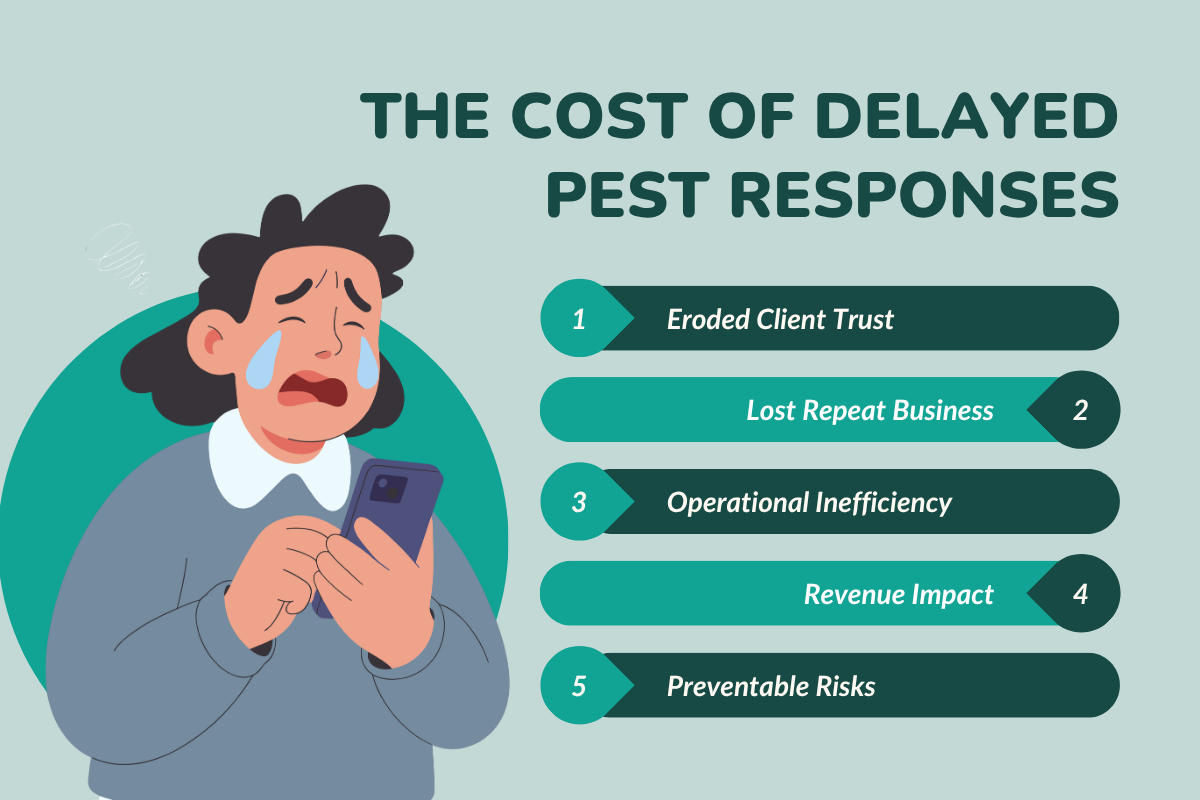
- Eroded Client Trust: Slow emergency responses make customers question the reliability of your pest control services, reducing confidence in your brand.
- Lost Repeat Business: Customers expect fast action during pest emergencies. Delays can lead to fewer recurring treatments and missed opportunities for long-term relationships.
- Operational Inefficiency: Without real-time scheduling, staff spend extra time rescheduling, redirecting technicians, and manually managing calls, which increases labor and fuel costs.
- Revenue Impact: Each delayed response can result in lost revenue, unhappy clients, and potential negative reviews that can affect future business.
- Preventable Risks: Untreated infestations can escalate, resulting in more severe problems that require additional time, chemicals, and resources to resolve.
What Are The Key Features of Effective Pest Emergency Scheduling Software
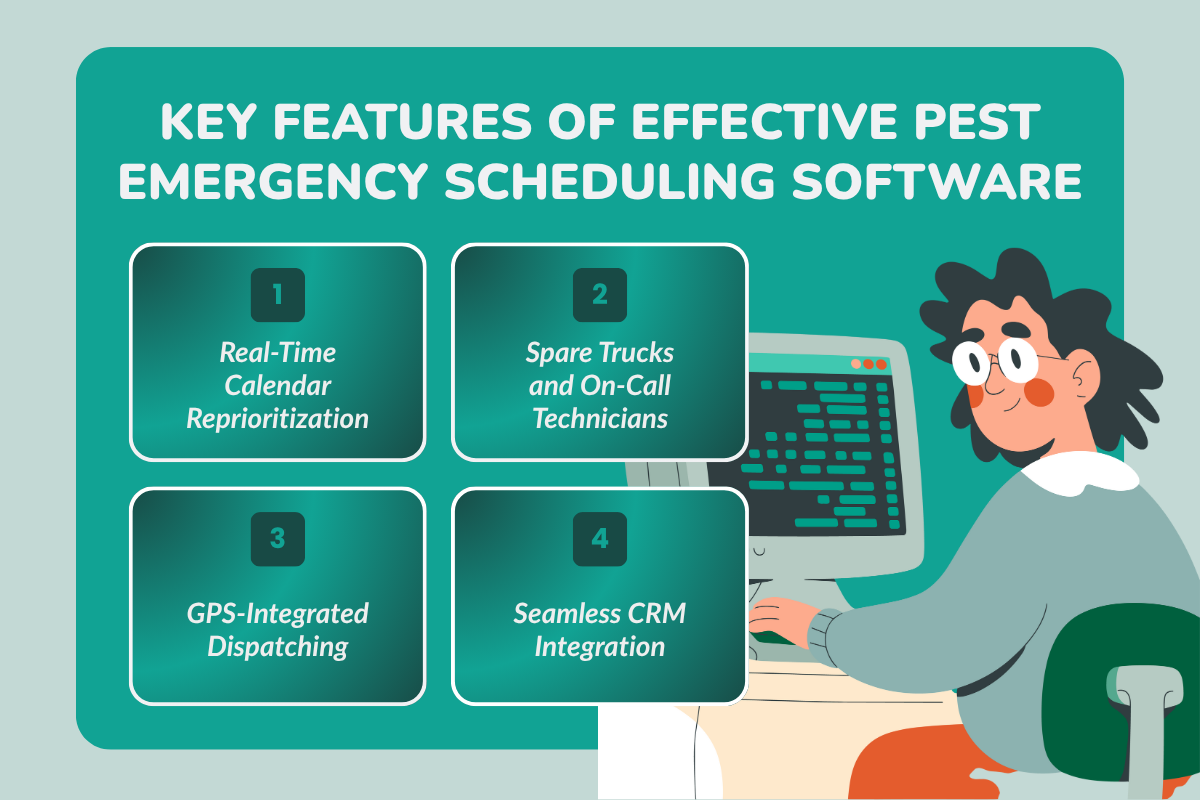
Efficient emergency dispatch requires software that balances real-time responsiveness with effective resource management. Here are the essential features to look for:
1. Real-Time Calendar Reprioritization
Dynamic Scheduling: Advanced pest control scheduling software automatically adjusts technician calendars to accommodate urgent calls.
Manual intervention becomes nearly obsolete, freeing office staff to focus on other operations.
Instant Updates: Technicians receive notifications instantly on their mobile app, ensuring everyone is informed of schedule changes as they happen.
For example, a technician en route to a regular treatment job, then suddenly he is alerted about a nearby termite emergency. With automated routing and GPS guidance, they reach the client more quickly, thereby preventing escalation.
2. Spare Trucks and On-Call Technicians
Resource Allocation: Maintaining a pool of available vehicles and technicians ensures quick deployment in emergencies without compromising routine jobs.
Efficient Deployment: By using software like PestBase, you can automatically assign the closest available technician, streamlining response and cutting travel time.
This is particularly useful for commercial clients who may have multiple service requests in a single day.
3. GPS-Integrated Dispatching
Optimized Routing: GPS integration ensures technicians take the most efficient routes to urgent calls. It minimizes delays caused by traffic or poor planning.
Real-Time Tracking: Managers can monitor technician locations and dynamically adjust assignments. This visibility ensures timely arrivals, reduces wasted travel, and improves customer satisfaction.
4. Seamless CRM Integration
Centralized Information: With pest control business software, technicians have access to service history, chemical usage, and previous emergency calls in one place.
This improves efficiency and reduces the need for repeat visits.
Automated Updates: Every action is automatically logged, supporting inventory management, job tracking, and future planning. CRM integration enables your team to focus on delivering service rather than handling administrative tasks.
Having trouble with customer retention? Take a look at this: Customer Retention: Building Maintenance Programs with Software.
Benefits of Implementing Smart Scheduling for Emergency Calls
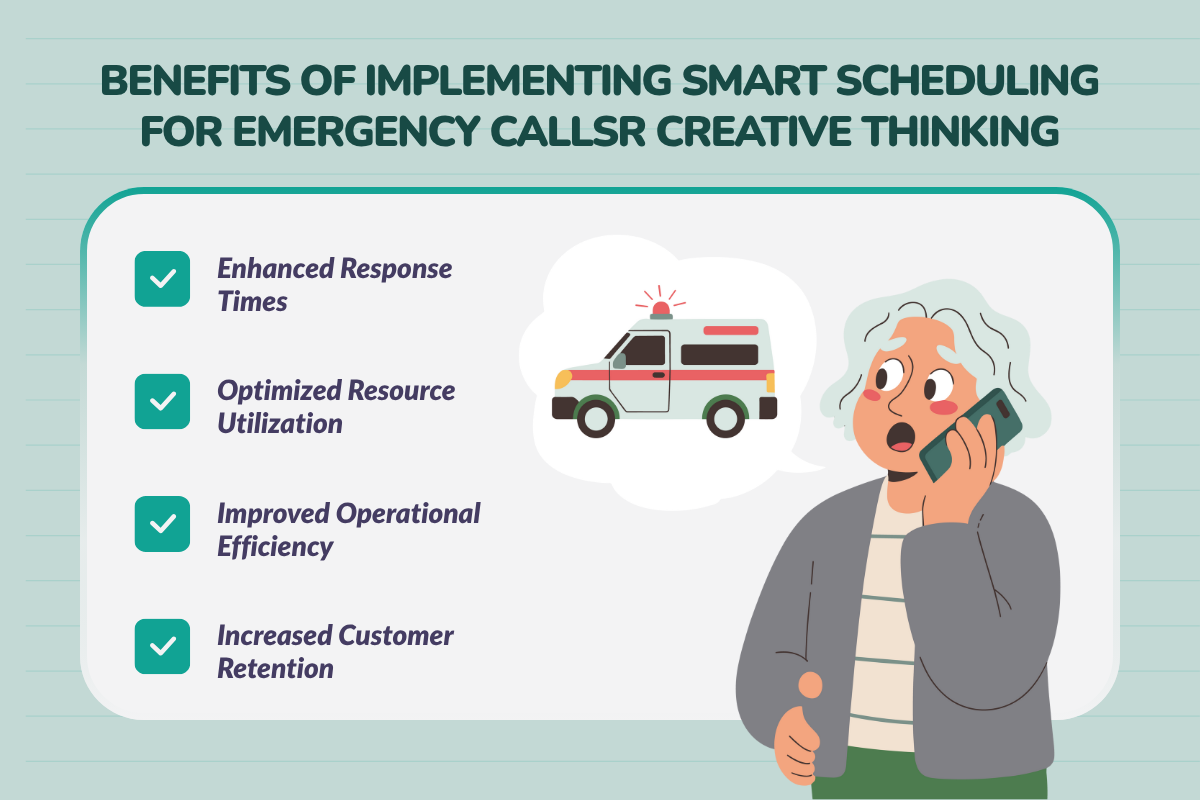
Intelligent scheduling transforms how pest control companies handle urgent calls, making operations faster, more efficient, and customer-focused.
By utilizing pest emergency software, teams can manage emergencies without disrupting routine work, enhance response times, and foster stronger client relationships.
Let's look at the benefits of implementing intelligent scheduling:
1. Enhanced Response Times
A quick response is vital in pest control. Using pest control management software to automate job scheduling ensures emergencies are handled swiftly, preventing infestations from spreading.
Quicker responses lead to higher customer satisfaction and fewer complaints.
2. Optimized Resource Utilization
With automated assignment and route optimization, spare trucks and on-call technicians are deployed effectively. Technicians avoid idle time and unnecessary backtracking, thereby improving efficiency and reducing costs.
3. Improved Operational Efficiency
Emergency calls no longer derail regular routes. Technicians stay productive, and office staff can manage schedules without constant manual intervention. This makes your pest control operation smoother and more predictable.
4. Increased Customer Retention
Reliable, prompt service builds trust. Customers who see professionals respond quickly during pest emergencies are more likely to stay loyal, refer others, and engage in recurring treatments.
Confused about how to choose the best pest control software? Check it out here: Comparing Pest Control Apps: Door-to-Door vs Inbound Sales.
Best Practices for Managing Emergency Pest Control Dispatch
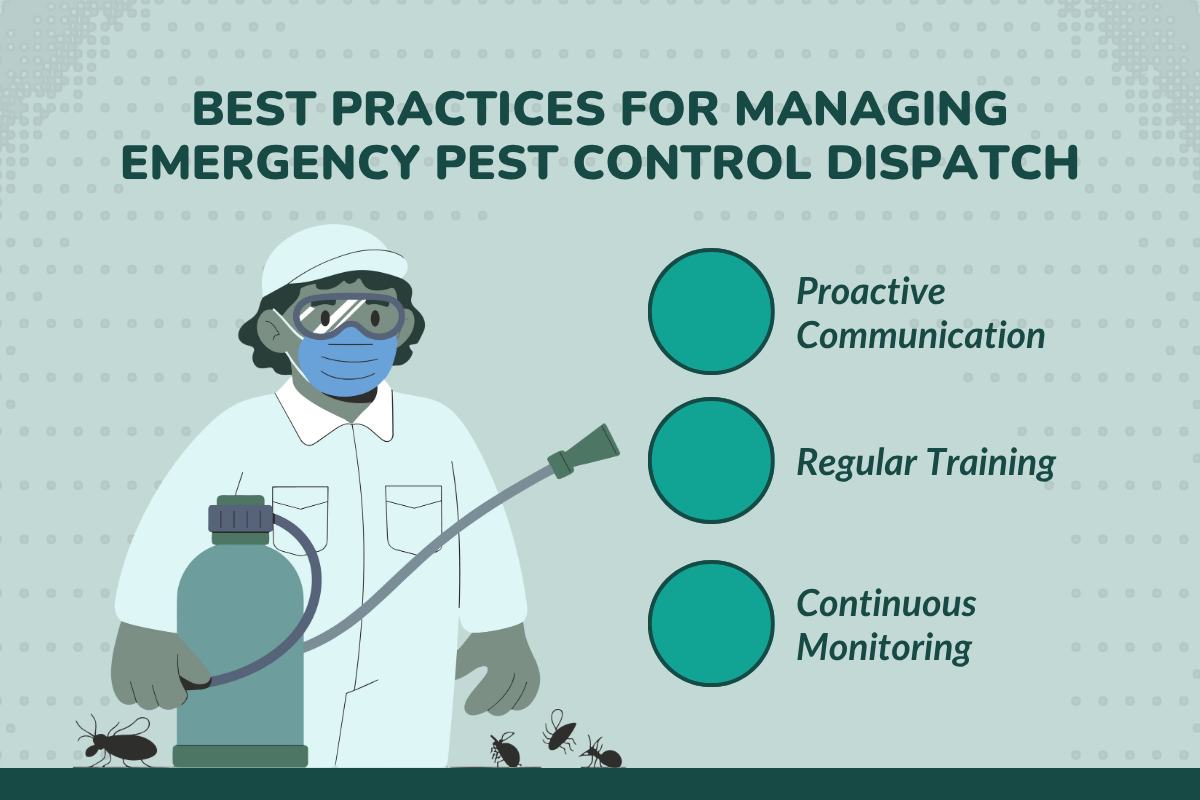
Handling urgent pest calls efficiently requires more than just fast responses. By combining clear communication, well-trained technicians, and data-driven monitoring, pest control businesses can maintain high service standards even under pressure.
These best practices help ensure timely interventions, satisfied customers, and smoother operations for your field teams.
Proactive Communication
- Keep clients informed in real time with SMS or mobile app notifications about arrival times, delays, and treatment progress updates.
- Reduce uncertainty and enhance customer satisfaction by providing timely and transparent updates on the status of emergency responses.
Regular Training
- Conduct scenario-based drills so technicians are prepared to handle infestations quickly and safely.
- Equip field teams with the latest knowledge on equipment, chemicals, and emergency safety protocols.
Continuous Monitoring
- Use field service software analytics to track response times, technician locations, and job completion efficiency.
- Identify operational bottlenecks and refine schedules based on performance insights for smoother emergency dispatch.
Future Trends in Pest Emergency Scheduling
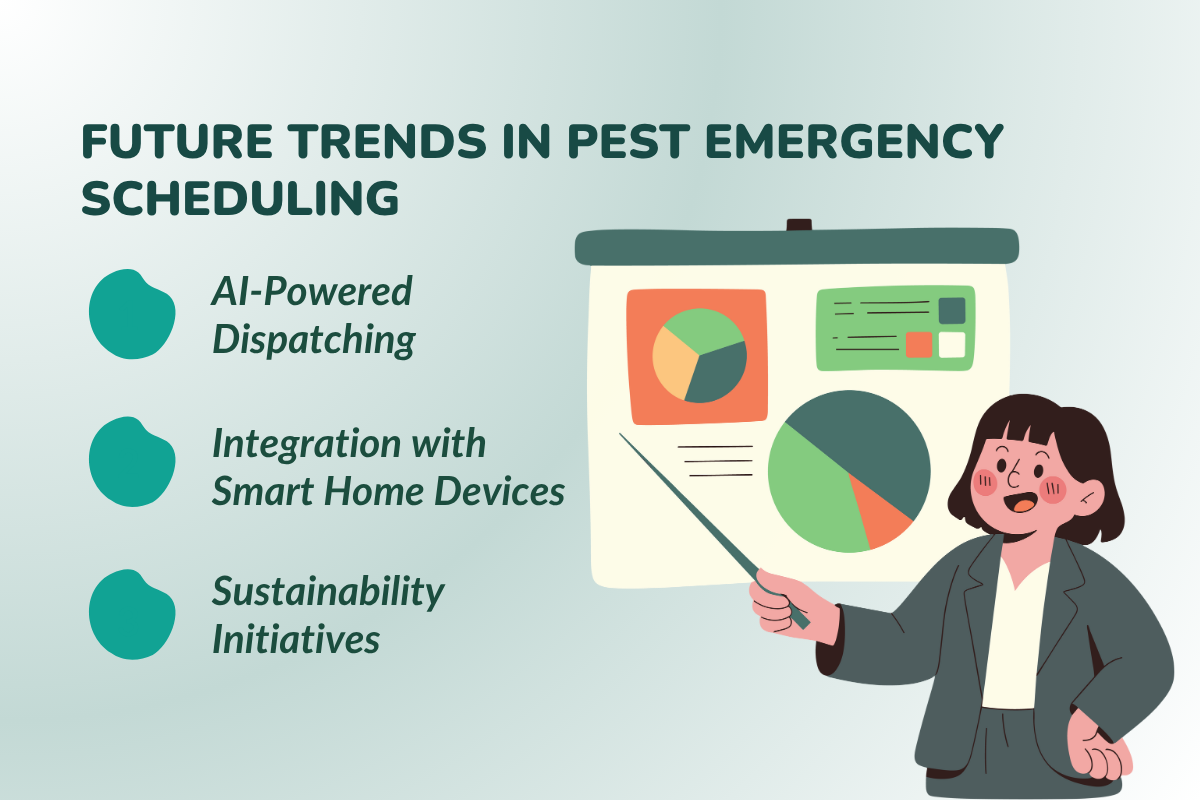
The pest control industry is evolving, and emergency scheduling is no exception:
1. AI-Powered Dispatching: Predictive algorithms anticipate peak call times, allowing your team to pre-allocate resources and reduce wait times.
2. Integration with Smart Home Devices: Sensors can alert your business to early signs of infestations, enabling faster response.
3. Sustainability Initiatives: Eco-friendly chemicals, energy-efficient routing, and responsible chemical tracking practices are increasingly important.
These trends underscore the need for effective pest control software that can accommodate dynamic scheduling challenges and deliver real-time operational insights.
Why PestBase Is the Best Fit for Emergency Pest Dispatch
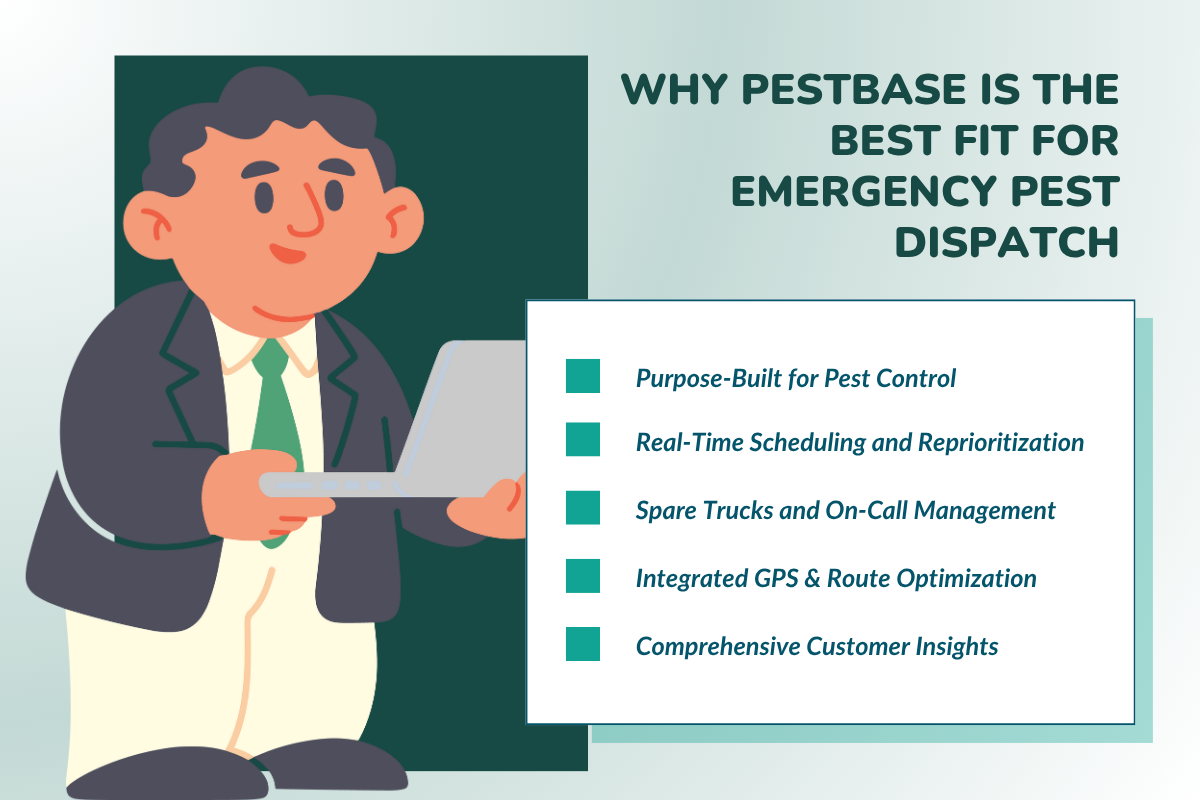
PestBase equips pest control teams with real-time scheduling, GPS tracking, and on-call management, ensuring fast, efficient responses and satisfied customers.
- Purpose-Built for Pest Control: Unlike generic software, PestBase is specifically designed for pest control businesses, aligning perfectly with real-world workflows.
- Real-Time Scheduling & Route Optimization: PestBase automatically assigns the nearest available technician to emergency jobs, reducing travel time and fuel costs. With optimized routing, teams can handle more calls per day without delays.
- Smart Priority Management: The software instantly flags urgent service requests and rearranges technician schedules in real time.
- Mobile App for On-the-Go Technicians: Technicians receive instant job notifications, customer details, and route maps directly on their mobile devices. They can update job status, upload photos, and record notes all from the field.
- Live Customer Updates & Notifications: PestBase keeps clients informed with automatic SMS or email updates about technician arrival times, delays, and service completion, boosting transparency and customer trust.
- Centralized Dashboard for Dispatch Teams: The admin dashboard offers complete visibility into technician locations, ongoing jobs, and pending requests.
- Seamless Integration with CRM & Billing: From customer history to payment processing, PestBase syncs all data in one platform. This eliminates manual entry and ensures that invoices, service logs, and follow-ups are always accurate.
- AI-Powered Predictive Insights: PestBase’s analytics identify patterns in emergency calls, helping managers anticipate peak infestation periods and allocate resources accordingly.
With PestBase, pest control companies can confidently handle emergencies, maintain high service standards, and strengthen customer relationships.
Conclusion
Emergency pest calls are inevitable, but how your business handles them makes all the difference. Innovative scheduling solutions, such as PestBase, enable teams to respond quickly, deploy resources efficiently, and maintain regular operations that run smoothly.
Adopting this technology enhances operational efficiency, customer satisfaction, and retention, while enabling your business to grow without being hindered by ad-hoc emergencies.
Moreover, intelligent scheduling transforms reactive chaos into proactive control, giving your business the competitive edge in the pest control industry.
Never Let a Pest Emergency Catch You Off Guard
Stay one step ahead with PestBase. Instantly dispatch technicians, optimize routes, and keep clients informed to turn chaos into smooth, stress-free pest control operations.
Start your plan today. Schedule A Demo with PestBase.
FAQs
1. Can PestBase manage both routine and emergency calls simultaneously?
Yes. PestBase integrates regular routes with urgent dispatch, keeping your service teams productive and responsive across all pest control services.
2. Does PestBase support mobile access for technicians?
Absolutely. Technicians get real-time updates, notifications, and job details directly in their mobile app, enabling instant access from anywhere.
3. Can PestBase optimize routes for multiple urgent calls?
Yes. GPS tracking and route optimization ensure technicians take the fastest routes to each job site, reducing delays and improving customer satisfaction.
